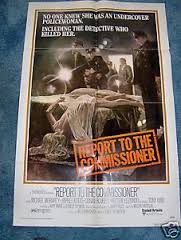
REPORT TO THE COMMISSIONER
US, 1974, 112 minutes, Colour.
Michael Moriarty, Yaphet Kotto, Susan Blakeley, Hector E11zondo, Tony King.
Directed by Milton Katselas.
Report To The Commissioner is not one of the police heroics sagas. Rather, it is a deadly serious look at recent Post-Watergate? America, this time a police cover-up and the vicious consequences of face-saving lies and victimisation. A very naive young policeman is involved in a crisis. Audience attention is challenged - changing from suspicion to sympathy and dismay. There is plenty of New York "atmosphere" and some exciting chases, culminating in a tense wait-out in an elevator. Michael Moriarty is the young man, Susan Blakely effective as an ambitious undercover agent. Writer Abby Mann wrote Judgement at Nuremburg, Ernest Tidyman, The French Connection. The film is grimly engrossing.
1. This film seen within the popular police genre of the 70s? How similar, how different? Why the popularity of this genre on film and television?
2. The emphasis of the title on the report, the structure of the film in terms of the report? (The English title was Operation undercover - was this a better title?) The mid-seventies and the political and police reports, the atmosphere of Watergate and cover-ups in reports? The critical tone of the film?
3. The writers were responsible for The French Connection and Judgement at Nuremburg. Combining issues: injustice, exciting police chases etc.?
4. How involved was the structure of the film? Initial sympathies concerning Bo, the flashback structure, the filling in of the report, interviews, the changing attitudes towards Bo and towards the police? Growing audience involvement?
5. How strong were audience sympathies for Bo? The quality of the performance of Bo? Critics' attitudes in thinking that he was unreal and naive? Are young people like this? our reaction to the initial killing? His suffering, naivety, the background of his father? His earnestness to succeed with the police? Training, first assignment, shabby look? Crunch and his initiating him into the wags of the police? The police decision to use him? His not being informed fully about Patty Butler? His ingenuity in tracing her? His feelings of protection? The ultimate violence, accidental death, chase and final confrontation? The naive young nun used and becoming a victim of authority?
6. The importance of the New York atmosphere, the locations of the streets and their sleaziness, the drug peddlers, the police officers, the sordid and squalid atmosphere? The importance of this for understanding police work?
7. How well did the film build up the background of the elevator crisis, a death, Bo's shooting?
8. The nature of the crisis, the psychological conflict, leading to his hanging himself? The futility of his life and career? The grim commentary of the proceedings?
9. Comment on the picture of the New York Police: their work, their efficiency, the people they had to deal with, problems, criminals, the atmosphere of secrecy. The plans of De Angelo, the approval from authority, the presumption to move without authority, the need for cover-up because of initiative and subordinates thinking they had good ideas? The chief ordering the report, then refusing to act publicly on it? The audiences judgement on such cover-ups?
10. The portrayal of Crunch, his work, skills, contacts, friendship and guiding of Bo?
11. The character of Patty Butler? Young and ambitious, the scene where she wanted to succeed, her skills, her moving in with Henderson, her trying to ward off Bo, the futility of her death?
12. How did the film communicate the atmosphere of the drug world? Stick and his wealth, the character, the peddling?
13. The police contacts, e.g. the messenger with no legs?
14. The set-pieces of the clubs, the streets, the hustling?
15. The excitement of the chase of the man with no legs and his holding on to the cars etc.? Plausible? Dramatically important for the film?
16. The melodrama and excitement of the roof chase? The chase in the store?
17. How intense was the confrontation in the elevator? Two guns pointing at each other? The psychological conflict? The lack of trust, the need for trust and banding together? The taunts of the police? The inevitability of Stick's death? The confusion for Bo? His emerging from the elevator?
18. How important was the soul-searching of America and the American police in this film? Is such probing necessary?